Civic Space in Eastern Europe & Eurasia
Measuring risk and resilience of civil society to Kremlin influence
Barometers of Civic Space
In recent years, a growing number of actors—both domestic governments and foreign actors—have sought to co-opt, control, and curtail civic space in an effort to discourage political challenges and influence civil society, even in relatively democratic countries.
Yet, despite eroding democratic norms and malign foreign influence being a top concern for many countries, policymakers, advocates, and scholars lack reliable data to monitor and respond to these trends over time.
To fill this critical data gap, AidData has collected and analyzed vast amounts of historical data on civic space and Russian influence across 17 countries in Eastern Europe and Eurasia (E&E) between 2010 and 2021. The resulting reports—a regional synthesis report and 17 individual country profiles—quantify key barometers of civic space in ways that are comparable across the region and that can be scaled to future years and regions.
For partnerships and media queries, contact:

Alex Wooley
Director of Partnerships and Communications
Regional Focus: Russia's periphery
How strong or weak is the enabling environment for civic space in Europe and Eurasia? To what extent do we see Russia attempting to shape attitudes? Over the past three years, AidData has generated and analyzed novel data on four barometers of civic space from 2010 to 2021 to systematically assess the trajectory of civic space attitudes and constraints throughout the region. We tracked: (1) restrictions of civic space actors (restrictions); (2) citizen attitudes toward civic space (perceptions); (3) Russian financial and in-kind support relevant to civic space (Kremlin support); and (4) Russian state-backed media mentions of civic space actors (Kremlin media).
Civic space is one of three of AidData focus areas. Learn more about our research on energy security and media resilience in the E&E region.

Regional Synthesis
This regional synthesis report monitors trends in the health of civic space across Europe and Eurasia (E&E) over time (2015 to 2021) in the lead up to Russia's February 2022 invasion of Ukraine. In conjunction with historical data, we draw upon the results of a 2022 AidData survey to capture contemporary insights on perceptions of civil society organizations across the E&E region and identify the best avenues to further strengthen the capacity of these domestic actors without undercutting their credibility.






















